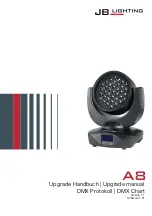
Freeze
Usually, all the oscillators respond to all the controls. However, you can freeze the frequency of certain oscillators while the
others continue to respond to controls. To do this, press the
Freeze
button or send a trigger into the
Freeze
jack. The button
will turn blue and some of the oscillators will be frozen. Press the button again or send another trigger to unfreeze the
oscillators.
Learn Mode
You can create your own scales and save them, replacing any of the factory-programmed scales. The process of
programming your own scale is called “Learning”. You can Learn a new scale in two ways: 1) manually dialing-in a series of
pitches using the knobs, or 2) using an external CV and gate source such as a CV/Gate keyboard, or CV sequencer. The
words under some knobs are written inside black bubbles (
Add Note
,
Fine Tune
, and
Delete Note
). These are used in
Learn mode. See Tutorial 2: Create Your Own Scale with Learn Mode (page 9), and the Learn Mode section (page 14).
Shift Functions
There are several advanced features that won’t need to be adjusted often, but can make important and subtle changes to
the module’s behavior. Take a look at the faceplate and notice that the word
Shift,
highlighted in gold
,
is written underneath
the
Freeze
button and that several of the knobs include an alternate name, written underneath and highlighted in gold. To
use one of these alternate features, hold down the
Shift
button while turning the knob. Changes to the shift functions are
saved and will persist after power down. A brief description of these features follows. For greater detail, consult the
dedicated section on each feature (pages 15-17).
# Oscillators
sets the number of active oscillators (1-16).
Stereo Mode
changes the way the oscillators are panned.
Freeze Mode
changes which subset of oscillators is frozen.
Crossfading
controls the steepness of the crossfading curve.
Page of
5
19





































